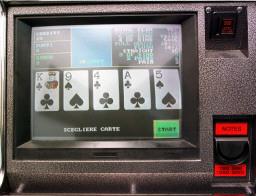An Italian researcher believes she has cracked brain mechanisms that make people want to continue gambling even when the odds are against them and the consequences are disastrous.
Donatella Marazziti, a psychiatry lecturer at Pisa University, has carried out two studies on compulsive gambling, an increasingly worrying disorder that has been likened to drug addiction or alcoholism.
In the first, she put a set of compulsive gamblers and a control group of non-gamblers through a barrage of mental tests.
The only difference emerged in the Wisconsin Card Sorting Test (WSCT).
Whereas the non-gamblers learned from their mistakes and stopped making them, the gambling addicts simply couldn't, Marazziti told ANSA.
''This is a sign of cognitive rigidity, a dysfunction that lies in the prefrontal cortex, the brain's control centre''.
The prefrontal cortex regulates behaviours such as eating and sex. It is sometimes called the 'pleasure centre' or 'reward pathway'.
Marazziti said 'targeted treatment' such as behavioural therapy might address this problem.
In the second test, Marazziti found lower levels of the neurotransmitter serotonin in addictive gamblers.
As well as being the 'feel-good' substance that is very low in depression, serotonin is ''an inhibitor of reckless behaviour,'' Marazziti said.
''This explains their irrational impulsiveness,'' she said.
Marazziti's study on cognitive rigidity has been published in the journal Clinical Practice and Epidemiology in Mental Health.
Her other one, on serotonin and rash behaviour, is set to be published in another prestigious US journal, Neuropsychobiology.
Compulsive gambling, also known as pathological gambling, is defined as being unable to resist impulses to gamble which can lead to severe personal or social consequences.
The disorder usually begins in early adolescence in men, and between ages 20 and 40 in women. It has become an increasing problem in recent years with a sharp rise in online gambling, a spread of poker machines in bars and hotels and the explosion of poker games on satellite TV and the Web. In people who develop compulsive gambling, occasional gambling leads to a gambling habit. Stressful situations can worsen gambling problems.
People with pathological gambling often feel ashamed and try to avoid letting others know of their problem. The American Psychiatric Association defines pathological gambling as having 5 or more of the following symptoms: - Spending a lot of time thinking about gambling, such as past experiences or ways to get more money with which to gamble - Needing to gamble larger amounts of money in order to feel excitement - Having had many unsuccessful attempts to cut back or quit gambling - Feeling restless or irritable when trying to cut back or quit gambling - Gambling to escape problems or feelings of sadness or anxiety - Gambling larger amounts of money to try to make back previous losses - Lying about the amount of time or money spent gambling - Committing crimes to get money to gamble - Losing a job, relationship, or educational or career opportunity due to gambling - Needing to borrow money to get by due to gambling losses This destructive type of gambling is on the rise all over the world.














